From "Bo-Jack Horseman" to "Black Mirror"
-
10. “Stephen Colbert’s Live Election Night: Democracy’s Series Finale,” Showtime
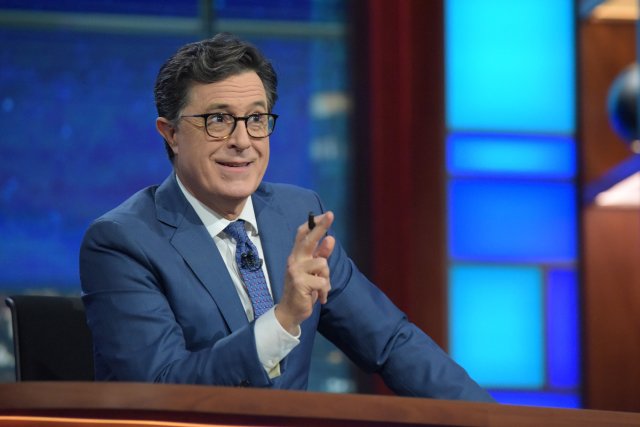
Scott Kowalchyk—CBS /Getty Images This election special had pretty clearly been planned with a different electoral outcome in mind—as host Colbert announced state after state rallying behind candidate Trump, the live audience groaned, less and less hopefully each time. This wasn’t well-made TV, exactly: Its seams showed throughout, and a panel discussion fairly transparently meant to hail the election of Hillary Clinton found comedians left without jokes at a pained, bitter loss for words. And yet this special’s documentation of a particular, and common, experience of election night 2016 made it a raw and revealing piece of television, even more so than network news broadcasts that moved quickly to rationalize the biggest political upset in generations. Just about the only thing about the special that doesn’t ring true to viewers still stunned by Trump’s election is the episode-ending benediction about the civic ties that hold Americans together—the shock, though, endures.
-
9. “San Junipero,” Black Mirror , Netflix
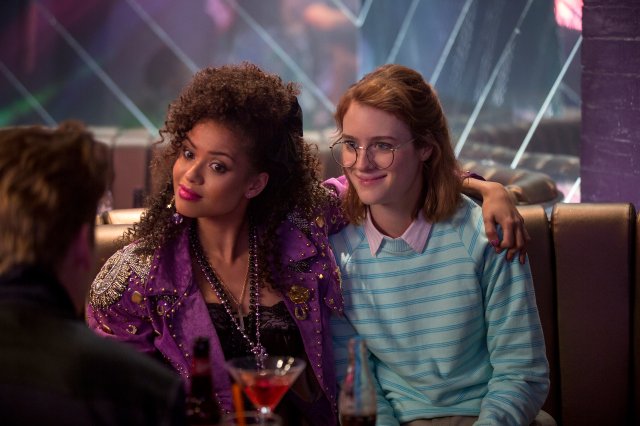
Laurie Sparham/Netflix The British anthology series has always had a spotty record—for every episode that carries across interesting ideas about the way we live with technology, there’s one that’s thuddingly obvious about a point that doesn’t merit an hour’s consideration. (Sometimes, these perceptive highs coexist in the same episode, or even the same minute, as these belabored sermons.) But in “San Junipero,” which starts off in the 1980s in a party-centric beach town and journeys unimaginably past that premise, technology serves a story that’s more human than anything the show had ever before produced. Skittering through time to tell a story of redemptive and surprising love that might just have the potential to outlast even death, “San Junipero” has its share of narrative twists, but it’s the strength of its writing and acting that hold the viewer’s focus, and keep the episode sharply embedded in memory. Mackenzie Davis and Gugu Mbatha-Raw should win a special Emmy for their uncanny chemistry.
-
8. “Meth(od),” High Maintenance, HBO
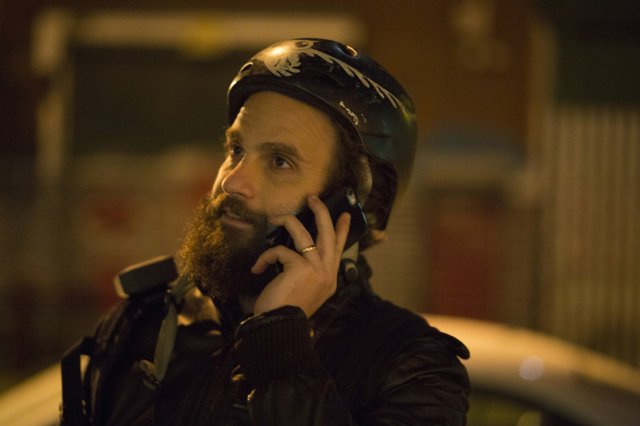
HBO What was once the web-native series of shorts High Maintenance had a remarkable season on HBO, expanding its running time to half an hour while sacrificing none of its shaggy curiosity. The series, about the clientele of a single marijuana dealer in Brooklyn, was able to dig deeper into stories, like the tale of a young gay man (Max Jenkins) who comes to realize that his relationship with his best friend (Heléne Yorke) is unbearably toxic, but can only replace it with other kinds of drama. These characters had appeared on a web short, but their story, given space to flower, goes to daring and, even in this enlightened age, necessary places: Jenkins’s character is both a refreshing corrective to and painfully entranced with gay stereotypes that thrive in media to this day.
-
7. “Fallen Heroes,” The Carmichael Show, NBC
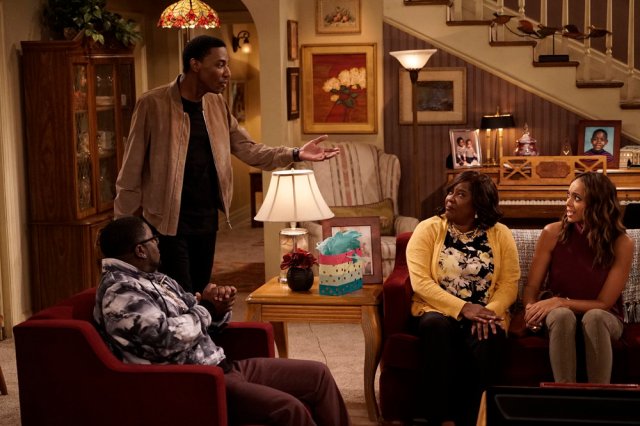
Chris Haston—NBC “The Cosby Show was so important,” Jerrod Carmichael (played by Jerrod Carmichael) tells his family as they debate the legacy of disgraced comedy icon Bill Cosby. “It made us realize we could go to college. I mean, we didn’t, but we knew we could.” This episode, the strongest, in a terrific season, applied Carmichael’s template of half-hour-long round-robin debate to a topic that cut very close to the bone. Every character in Carmichael’s universe had a strong opinion about Cosby’s misdeeds and his legacy—or several, butting up against each other—and the debates were at once vibrantly hilarious and rightly dispiriting. Carmichael, a contrarian by nature, knows that this debate’s impossible to settle. Cosby’s impact, after all, is ratified by the fact that a sitcom about a black family living in suburban Charlotte is closer to unremarkable today than it would have been in the 1980s. And the diminishment of his legacy is proven by the fact that this family rejects respectability politics, that in their endless arguments they are as unapologetically outspoken and crass as white families have been allowed to be. The whole series is a debate about its NBC predecessor: This one, brilliantly, just moved the matter from subtext to text.
-
6. “The Winds of Winter,” Game of Thrones, HBO
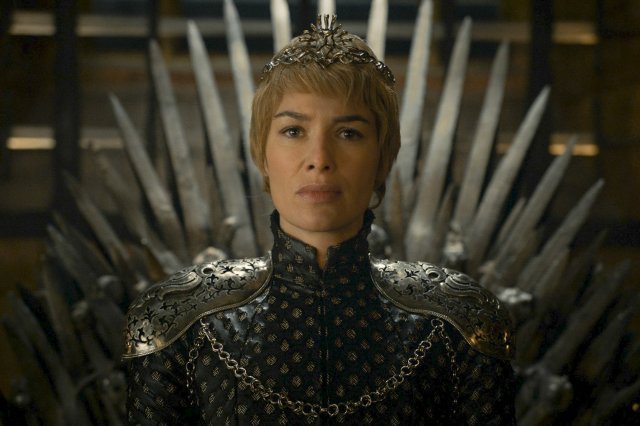
HBO “Battle of the Bastards,” the episode that preceded this one, was the series’s most technically accomplished ever, a splashy spectacle that nothing else on TV could hope to match. But the remarkable sequence that led to the destruction of the Sept in this episode is, for me, more memorable, marrying almost-painful tension with rapid plot development. This episode’s growing sense that the gears of Game of Thrones are finally clicking into place for an endgame was crowned by a remarkable final shot. It was spectacle enriched with real consequence.
-
5. Megyn Kelly’s interview with Newt Gingrich, Fox News
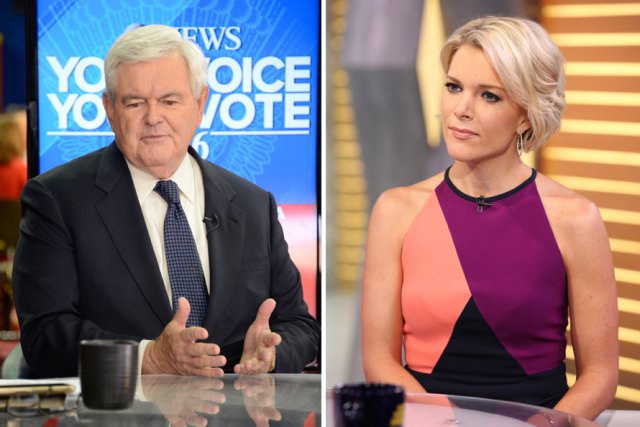
Getty Images (2) This election was not one with much TV news coverage I’d place in a best-of list, or even a tolerable list. But on the margins, odd and fascinating stuff occasionally found purchase, as in Kelly’s surprisingly combative interview with the former Speaker of the House in the run-up to the election. Accused of being “fascinated with sex” for reporting on allegations of assault against Donald Trump, Kelly defended her work and herself in surprisingly sharp terms, eventually telling Gingrich to “take your anger issues and spend some time working on them.” With this exchange, Kelly ratified her status as the most interesting woman in TV news, standing in for the anger and frustration of women who opposed Trump while still making clear she was no Clinton defender. The clip resonates all the more after Trump’s win—raising the question of just what the future may hold for a critic of the Republican president on a network not congenitally inclined to oppose him.
-
4. “Marcia, Marcia, Marcia,” The People v. O.J. Simpson: American Crime Story, FX
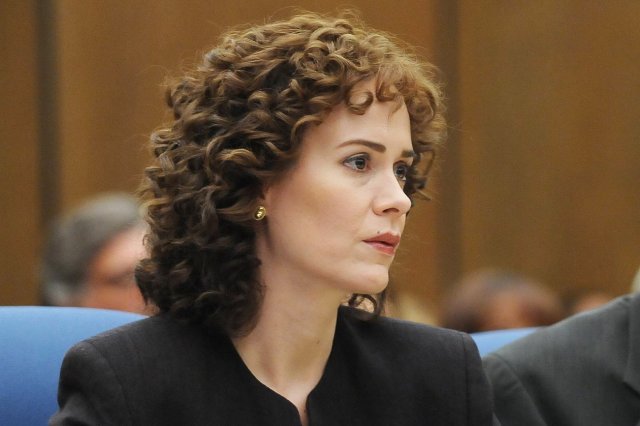
Ray Mickshaw���FX The People v. O.J. Simpson was so strong across the board, and so unified in its vision and style, that it’s hard to pick out a single installment worthy of special consideration, but the episode dealing with Marcia Clark’s particular challenges as a female prosecutor is such a good showcase for Sarah Paulson that it deserves special mention. The series at large used the trial to prismatically examine every conceivable issue connected to it; in miniature, this episode looked at all the different sorts of misogyny Clark faced, and all the ways in which she failed to make the trial any easier on herself than it might otherwise have been. The scene in which Clark, having so internalized the critiques of herself and so misread what the public wants of her, flaunts a grievous new perm—that’s heartbreaking stuff.
-
3. “Hope,” Black-ish, ABC
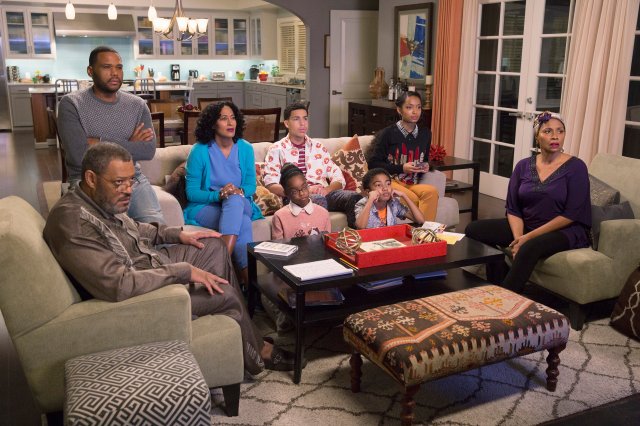
Patrick Wymore—ABC/Getty Images An acquittal of a cop in a fictional racially-motivated misconduct case sets off the action of this episode, sophisticated even by Black-ish’s high standard. The debates that ensue among the Johnson family—over whether to raise children with hope or fear, over whether to protest or avoid rocking the boat—feel only more relevant now than they did when the episode aired in February. The episode manages to deal in granular detail with concerns many families face, all while shrewdly managing to use each character to their best comic effect.
-
2. “Toast Can’t Never Be Bread Again,” Orange is the New Black, Netflix
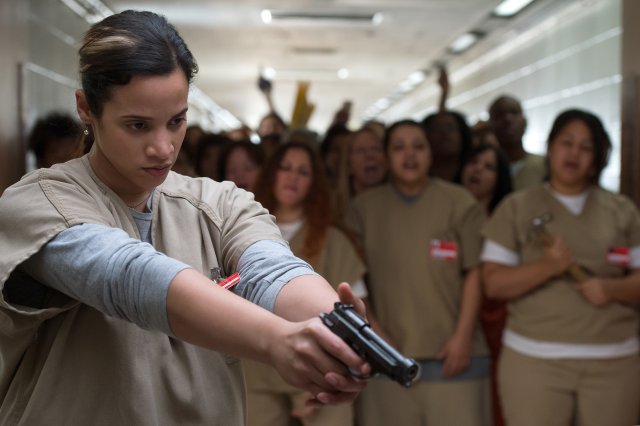
JoJo Whilden—Netflix Under the radar of many viewers, Orange is the New Black aired its strongest season this summer, building to a startling and painful twist near its end as Poussey (Samira Wiley) met her end at the hands of a power-drunk guard. Orange is the New Black has flirted with comedy, to mixed results, in the past, but this season finale had a grim mastery of tone. It was alternately painful (when tracking the consequences of Poussey’s murder) and mega-painful (when flashing back to her life as a free woman). It all built to a moment of catharsis that’s only illusory—after all, the prison guards will always win—but that felt, in the moment, like a straw worth grasping
-
1. “Fish Out of Water,” BoJack Horseman, Netflix
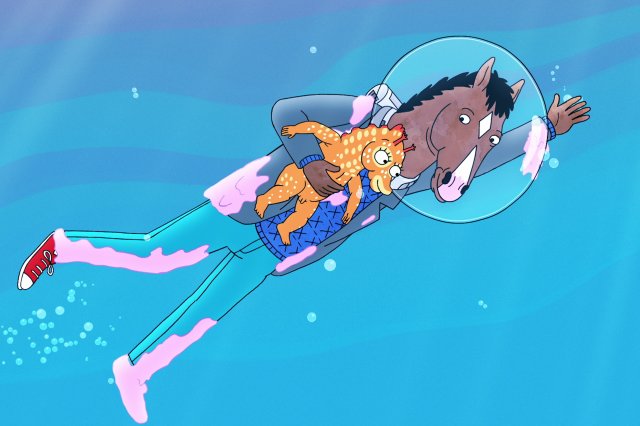
Netflix The year’s best episode of television was a stand-alone escape from harsh reality that proved reality always finds its way to catch you. BoJack (Will Arnett), the protagonist of this animated series, is a Hollywood actor forced to go to an undersea film festival to promote a film he’s lost enthusiasm for. Underwater, his inability to communicate with anyone is made literal—the episode, thanks to his restricting diving helmet, is practically a silent film—and attempts at forming a nonverbal connection with abandoned seahorse babies he rescues is only a temporary distraction. This episode is dazzlingly beautiful and among the most creative single episodes of TV in memory; it’s also a perceptive and painful look at being forced to confront one’s regrets.